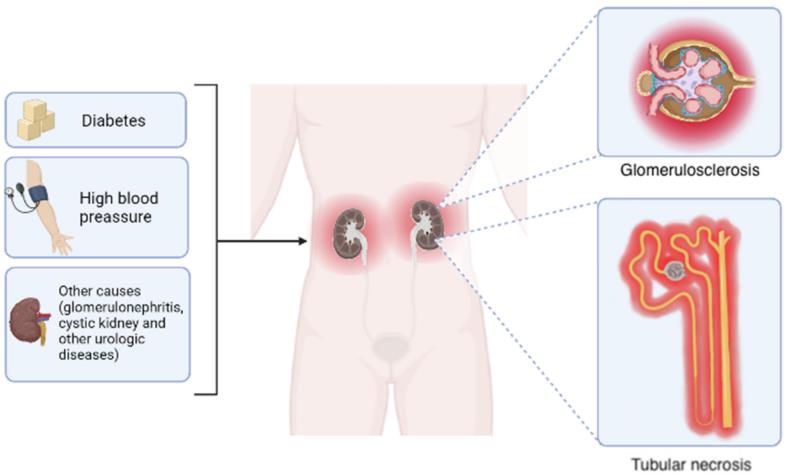NAA Service Based on Nephropathy
Natural autoantibodies (NAA) are autoreactive antibodies that arise independently of antigenic or mitogenic stimulation, and contribute to the stimulation of primitive innate system. NAA biomarkers to detect and track the progression of nephropathy are an unmet clinical need. With advanced high-resolution analytical platforms and experienced scientists, Creative Biolabs offers the most diverse portfolio of NAA services to assist our clients in nephropathy diagnosis or immunotherapy. We also provide custom services based on the requirements of our clients to meet the specific demand.
What Is Nephropathy?
Nephropathy is a broad spectrum of renal diseases or renal damages, which can eventually result in kidney failure. Every type of nephropathy can cause a certain extent of kidney dysfunction, which prevents the kidney from excreting any waste products and regulating the water and acid-base balance of the body. So, severe nephropathy may be a potentially fatal condition. The clinical symptoms of nephropathy are diverse, including but not limited to these:
- swollen eyelids, ankles, feet, lower legs, or hands (caused by water retention)
- fatigue, weakness (caused by lack of oxygen in the blood)
- loss of appetite
- weight
- darker urine (blood in the urine)
- shortness of breath
- nausea or vomiting
- generalized itchiness
In addition, individual diseases may have their own unique symptoms.
 Fig.1 Primary causes and morphological outcomes of chronic kidney disease.1
Fig.1 Primary causes and morphological outcomes of chronic kidney disease.1
The Relationship Between Nephropathy and NAA
Several natural autoantibodies have been characterized as associated with renal diseases with some of them being possibly implicated in pathogenesis. Using NAA biomarkers which can either target against kidney-specific autoantigens or against ubiquitous antigens as in systemic autoimmune diseases with renal manifestations to detect or diagnose nephropathy is promising and can reflect clinical responses to immunotherapy. What’s more, autoimmune-mediated damage to the kidneys can be triggered by natural autoantibodies directed against specific proteins or renal structures.
Common Types of NAA Associated Nephropathies
There are various types of nephrotic syndromes show close associations with natural autoantibodies produced in our body. The analysis of the repertoire of NAAs in nephropathy patients can identify novel, immunogenic protein targets that are highly expressed in the kidney glomerulus and tubules that may bear relevance in the pathogenesis and progression of nephritic diseases. The following is to introduce two well-studied types.
-
Lung hemorrhage nephritis syndrome (Goodpasture syndrome) - It is a rare autoimmune disease in which autoantibodies (anti-glomerular basement membrane, anti-GBM) attack the basement membrane in lungs and kidneys, leading to bleeding from the lungs and kidney failure. It describes the clinical entity of diffuse pulmonary hemorrhage and acute or rapidly progressive glomerulonephritis.
-
Adrenalitis - This disease is also called idiopathic primary adrenal insufficiency, among which autoimmune adrenalitis accounts for more than 70% of all cases of primary hypoadrenalism. And up to 75% of patients have autoantibodies against adrenal cortical zones (50% of autoimmune cases have circulating autoantibodies to 21 hydroxylase enzymes and anti-GBM).
How to Diagnose Nephropathy?
In general, the diagnosis of nephropathy requires a combination of blood tests, imaging examinations, a comprehensive review of the history and symptoms, and a physical examination. There are a series of sophisticated blood detection methods are always used in the clinic, among which, natural autoantibody test can innovatively help to diagnose nephropathy. A variety of highly specific and sensitive autoantibody tests have been developed in the past years and they are currently available to identify autoimmune kidney diseases at an early stage.
What Can We Do at Creative Biolabs?
Creative Biolabs has years of experience in the field of natural autoantibody research. Empowered by our advanced high-resolution analytical platforms and experienced technical team, we have established an NAA library associated with nephropathy from which you can find your interested targets. We also offer a whole set of NAA services to assist our clients in disease diagnose and clinical research. If you are interested, please feel free to contact us for more details.
Reference
- Lucero, Claudia M., et al. "Hypertensive Nephropathy: Unveiling the Possible Involvement of Hemichannels and Pannexons." International Journal of Molecular Sciences 23.24 (2022): 15936.
Choosing natural autoantibody (NAA) microarray to profile autoantibody repertoire and reveal novel disease's marker.
Related Services:
- Autoimmune Disorders
- Infectious Diseases
- Neurological Diseases
- Cardiovascular Diseases
- Endocrine Diseases
- Hematological Diseases
- Pulmonary Diseases
- Cancers

